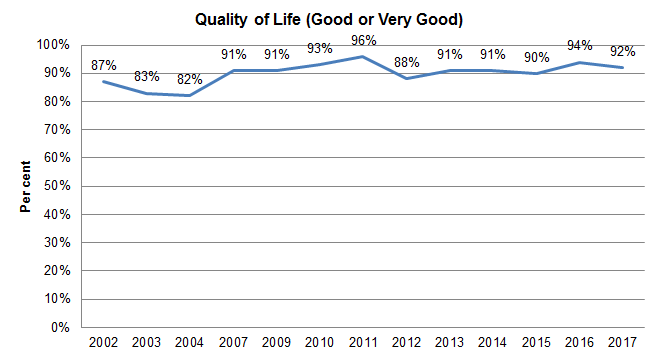92 per cent of Winnipeggers Consider Quality of Life ‘Good’ or ‘Very Good’
92 per cent of Winnipeggers believe that their quality of life is ‘good’ or ‘very good’—up from 87 per cent in 2002. This is according to the latest report from our Peg project.
92 per cent of Winnipeggers believe that their quality of life is ‘good’ or ‘very good’—up from 87 per cent in 2002.
This is according to new data from a survey on Winnipeg citizens’ satisfaction with life, just released by Winnipeg’s Peg project.
What else can Peg tell us about quality of life in Winnipeg?
Peg tells us…
- Quality of life has been on a general upward trend over the past 15 years, growing from 87 per cent in 2002 to 92 per cent in 2017.
- 2011 saw the highest number on record, at 96 per cent.
- 2017 saw a slight dip from the previous year - 92 per cent, down from 94 per cent in 2016.

Definitions:
- Quality of life is measured differently by different organizations and there is no commonly agreed methodology. On a fundamental basis, however, quality of life indicators are meant to measure the subjective well-being or happiness/sense of satisfaction with life within a population.
- The City of Winnipeg publishes the annual "Citizen Survey" which includes data on percentage of respondents who believe that the quality of life in Winnipeg is ‘very good’ or ‘good’.
Why does this matter?
- Quality of life is receiving renewed interest with national and sub-national policy makers due to the emergence of concepts such as Gross National Happiness as an alternative or complement to strictly economic or financial indicators of well-being.
- Many municipalities today continue their efforts to boost quality of life to attract and maintain investments and residents.
- More detail and source data for the above facts available at: http://www.mypeg.ca/explorer/WellBeing/SocialVitality/QualityOfLife/
Source of the data:
- Peg’s data for the Quality of Life indicator is provided by the City of Winnipeg Citizen Survey. Online copies of each survey may be found at http://winnipeg.ca/cao/surveys.stm.
Media inquiries:
For interviews on understanding the trend (or the story behind the numbers), organizations making a difference in the community, Peg, or the data, please contact:
Sumeep Bath, Media and Communications Officer
International Institute for Sustainable Development
(204) 958-7700 ex 740 | sbath@iisd.ca
Social media:
Twitter: @Pegindicators
Facebook: MyPeg
Youtube: MyPegCIS
About us:
Peg (mypeg.ca) is a community indicator system that measures the health of our community year over year – in ways that count. Peg is led by two partnering organizations – the International Institute of Sustainable Development and United Way of Winnipeg.
Peg is the starting place for Winnipeg citizens, educators, policy makers, and many others to learn more about our city so we can lead change to create a better city for our children and their children. At Peg we can all learn how our lives, our neighbourhood and our city is changing – for the good and the bad. Learn more at www.mypeg.ca.
About IISD
The International Institute for Sustainable Development (IISD) is an award-winning independent think tank working to accelerate solutions for a stable climate, sustainable resource management, and fair economies. Our work inspires better decisions and sparks meaningful action to help people and the planet thrive. We shine a light on what can be achieved when governments, businesses, non-profits, and communities come together. IISD’s staff of more than 250 experts come from across the globe and from many disciplines. With offices in Winnipeg, Geneva, Ottawa, and Toronto, our work affects lives in nearly 100 countries.
You might also be interested in
Good COP? Bad COP?: Food systems at COP29
The 29th United Nations Climate Conference (COP 29) in Baku failed to build on the notable progress made on food systems at COP 28. However, it wasn't all doom and gloom.
Baku Conference Sets New Collective Climate Finance Goal
The Baku Climate Change Conference (UNFCCC COP 29) delivered what the Earth Negotiations Bulletin (ENB) describes as “a milestone agreement that will inform climate action for years to come.” Countries set a new collective quantified goal (NCQG) on climate finance. The operationalization of the market-based cooperative implementation of the Paris Agreement (Articles 6.2 and 6.4) was another major outcome. Yet, parties could not reach agreement on a number of issues.
What to Expect at Plastics INC-5
Q and A with Tallash Kantai of Earth Negotiations Bulletin on INC-5.
What Drives Investment Policy-makers in Developing Countries to Use Tax Incentives?
The article explores the reasons behind the use of tax incentives in developing countries to attract investment, examining the pressures, challenges, and alternative strategies that exist.